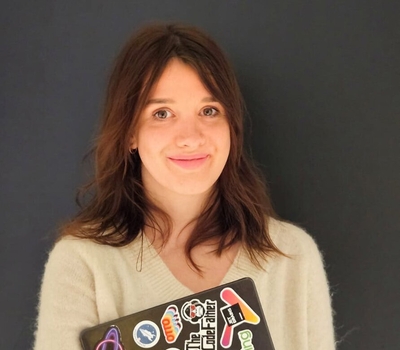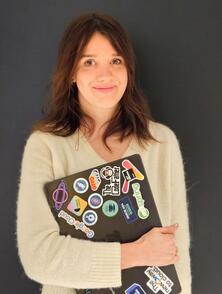What is the article about?
Nina is a Junior Software Developer, has been working in IT at OTTO since the beginning of 2022 and has made a truly inspiring journey, as we think. She originally comes from a healthcare management background, but decided to make a career change into IT some time ago.
She now works in Retail Logistics and, together with her team, builds services for the transfer of logistical product data from the existing world to the new scalable world in the cloud. Her day-to-day work revolves around Kotlin, Terraform and Google Cloud technologies.
However, it is obvious that software development is not something that can be learnt overnight and that her career change was quite challenging on some days. Find out how Nina mastered the challenge with the help of her team and her enthusiasm for IT!
Meet Nina – How she went from healthcare management to software development
You switched to IT as a career changer. How did that come about, how dit it work and what was it about that particularly appealed to you?
Switching to IT was and is an exciting journey. I originally came from a healthcare management background, but my fascination with technology and programming has never stopped.The defining moment was when I realised how powerful software can be in solving problems and optimising and speeding up processes. I was particularly attracted by the opportunity to develop directly accessible and innovative solutions through programming.
- Java Fundamentals, Object-oriented Programming and Advanced Topics (Exceptions, Generics, Collections, Lambdas, Streams, Multi-threading and Asynchronous Programming)
- Spring Fundamentals (including Spring Data JPA)
- basics such as version control (Git), design patterns, data structures and algorithms
- SQL, HTML, CSS, Javascript, Node.js Docker and Terraform Fundamentals
- ... as well as working with an IDE and writing tests
What did you experience as particularly challenging when you changed jobs?
The biggest challenges when changing jobs were definitely learning new technologies from scratch. Programming languages like Kotlin or Java were new to me, and understanding how Google Cloud works and how to use Terraform for Infrastructure as Code (IaC) was a steep learning curve. On top of that, it was integrating into an existing very senior team and reaching a skill level where I could contribute productively.Looking back, however, it was also a very enriching experience, as I grew continuously through these challenges. Due to the super appreciative and supportive teamwork, I was able to learn much faster than if I had been working on my own. The IT industry offers a dynamic and future-orientated environment in which you can constantly develop, which is very attractive to me.
What features / projects are you currently working on? And which tech stack do you use?
Basically, I work in Retail Logistics. Our processing product includes all the important information about a product that is required for warehousing and dropshipment and that needs to be checked during goods inspection. This information is essential for processing customer and supplier orders and for managing logistics.
I am currently working on a project to optimise our internal DevOps processes. It involves the automated import of "deadletter" messages from interface systems in the Google Cloud that could not be processed directly.
We use Kotlin and Spring Boot to develop our services, while Terraform is used for infrastructure automation. We also use GitHub for version control and collaboration and Github Actions for Continuous Integration/Continuous Deployment (CI/CD).

What is your favourite programming language?
My favourite programming language is Kotlin. I particularly appreciate the expressiveness and security that Kotlin offers, as well as its interoperability with Java. Kotlin combines functional and object-oriented programming paradigms in a very intuitive way, which makes the development process more efficient and convenient.
What has been the biggest challenge in your area of work in IT so far?
The biggest challenge so far has been the implementation of a complex microservice architecture project. This architecture required not only a deep understanding of the individual components, but also the ability to orchestrate and scale them effectively. We had to ensure that the services were not only independent, but also resilient and scalable. This project required detailed planning to ensure that all components interacted seamlessly with each other.
Particularly challenging was the system integrative test with many interfaces and the implementation of a robust communication system between the services. This required in-depth knowledge of distributed systems and intensive testing to ensure the reliability and scalability of the new architecture.
What do you like most about working in your team?
I particularly appreciate the open and collaborative atmosphere in my team. Everyone brings their individual skills and perspectives to the table, which makes problem-solving creative and efficient. Our team consists of a product owner, a senior dev and three developers. We all use agile methods such as Scrum to organise our work, which promotes transparency and continuous improvement.
The willingness to support each other and the shared focus on quality and innovation make working together very pleasant and productive. We enjoy working together and have a lot of fun in our team.
Another highlight is the willingness to share knowledge and support each other. Due to pair programming and regular code reviews, we are constantly learning from each other and improving our skills. This collegial atmosphere contributes significantly to the quality of our work. The Tech Days, where we can realise creative ideas, also motivate me.

Is there a subject area that particularly interests you and in which you would like to deepen your knowledge?
There are several areas in which I would like to further develop my skills. I am particularly interested in deepening my knowledge in Clean Code, architecture and the performance-optimised use of cloud resources. As security plays an increasingly important role in IT, I want to ensure that our applications and data are protected in the best possible way.
I am also interested in learning more about machine learning and AI to potentially integrate these technologies into our projects and make our solutions smarter.
Speaking of AI: What touchpoints do you already have with AI in your work and do you see any special use cases in your team?
In terms of AI, there are definitely exciting potential applications in our Retail Logistics division - but the Business Intelligence department is primarily responsible for this. One specific use case could be the optimisation of supply chains through predictive analytics in order to shorten delivery times and increase efficiency.
Another interesting area of application could be the automatic detection and classification of logistical problems to enable faster and more efficient solutions. This type of AI-supported system could help to further automate and optimise our processes, which would ultimately lead to improved customer satisfaction.
What advice would you give to career changers?
Find mentors and network with others in the sector to benefit from their experience. Take the time to learn the basics thoroughly and don't be afraid to ask questions or seek help when you need it. Patience and perseverance are key – it may be difficult to get started, but it's definitely worth it.
And finally, a brief look into the future: what are your long-term professional goals in the IT industry?
My main goal is to constantly develop valuable and innovative solutions that deliver real benefits. In the long term, I want to continue to deepen my technical skills and, together with my team, make a positive contribution and advance our products and services.
For me, the journey is the reward and I look forward to getting a little better every day, mastering new challenges and creating great software together as a team that offers real added value.
Want to become part of the team?

Get to know our Role Models in Tech.
2Comments
- 17.10.2024 16:07 Clock
<i>ok</i>test<img src=/>
- 17.10.2024 16:17 Clock
.
Written by

Similar Articles
 AlexanderFebruary 19, 2025
AlexanderFebruary 19, 2025AI assistant: From Vector Databases to Multimodal Agents
06Optimization of our AI assistant ✓ Use of agent-based modeling ✓ Read more about reasons for optimization & the path now!Data scienceDevelopmentMachine learning NinaJanuary 22, 2025
NinaJanuary 22, 2025Terraform Tips: Scalable and Reliable Infrastructure-as-Code – Part 2
05Optimize directory structure & resource organization ✓ Handling of input & output values ✓ Read more about Terraform Best Practices now!DevelopmentWorking methods





